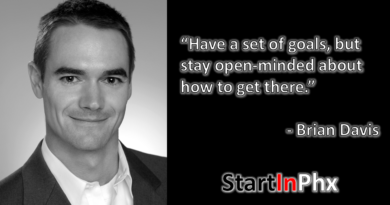Are You Really Ready to Hire That New Salesperson?
What Business Owners Need to Have Before Hiring New Salespeople
‘Salespeople are coin-operated.’
I’m sure we’ve all heard this common phrase sometime in our career and I believe there’s truth to it, especially for high-quality salespeople. They are experts at what they do and naturally, they want to make bank on it.
NOW, the question is, can you provide the necessary conditions for your new salespeople to maximize their potential for sales and their earnings?
After all, time is money and money is time. You don’t want to spend any more time or money recruiting and training sales talent than you absolutely have to. To that end you’d like to be confident you can attract A Players, that every new hire has reason to stick around, and that every member of your sales team has what they need to make a positive contribution to your team.
A Compensation Plan That Attracts The Right Sales Professionals
Of course, compensation plans are structured based on the varying sales experience and roles of your incoming sales hires. The crucial bit lies in your capacity to find and strike the right balance between base and bonus pay.
Business owners hope to curtail the downsides of their new salespeople to protect themselves against potential losses. For this reason 100% commission model aren’t unheard of, and considered by some to be an appropriate safety measure against bad sales hires. At the same time however, I believe the 100% model limits a business’ possible returns.
Salespeople want security too!
Sales professionals want the same ease of mind and earning power business owners go looking for when they decide to build a company; The freedom to hunt without everything at stake. Removing base salary from the equation places stress analogous to what owners experience early on.
During the on-boarding and pipeline development period it’s not uncommon for salespeople to see their incentive pay reflect the ramp-up as they become familiar with your product, your sales process, and your customers.
According to Trish Bertuzzi salespeople take four months to reach full productivity on average, and Jim Brown would argue that building up a pipeline capable of hitting quota might take as much as six months in a lot of cases.
Knowing this, high-quality and experienced sales candidates are going to be hard to entice with 100% commission offers.
Those who do find your offer appealing for it’s huge upside are a different breed of sales talent and typically fall into one of two camps.
CAMP #1: The sales professional is earlier on in their career and because of their limited experience they don’t have more promising offers available to them. The downside here is that they will require things from you as their employer that a more seasoned sale professional would not.
CAMP #2: The sales professional already has a few revenue streams. Your product or service seems to be a match with the customer base they already serve. If your product or service does take off with their customers it’s just business as usual, they just don’t make any more money that they already would have. For you that means the expense of training a rep who isn’t all that motivated to see your revenue increase.
That is why the right balance between base and bonus compensation has to be found. Put simply you need to understand what the role of sales in your organization looks like, what an A-Player looks like, and what their situation in life looks like.
Enough Leads to Warrant Sales Hires
Without a steady flow of leads generated for your salespeople, there won’t see consistent selling.
So what should business owners do? Expect new salespeople to both generate their own opportunities and close sales?
It’s certainly done that way in some companies, but when you ask a salesperson to own the sales process from start to finish a few things happen.
Why Salespeople Shouldn’t Own The Entire Sales Process
On-Boarding Takes Longer
Even among the most seasoned of sales professionals there is a learning curve when transitioning to a new company. There are things to learn that impact prospecting for new opportunities, qualifying opportunities, the discovery process required to service an oppotunity, and the presentation of offers.
When a business requires a new sales rep to learn the nuance associated with all the stages to a sales before the rep can be seen as successful in their role, it will take longer for that competence to be demonstrated. If the rep were tasked with having to master just a few stages, or simply one stage, their bandwidth would be more focused and mastery could be realized more quickly.
Sales Hire ROI Goes Down
With it taking longer for individual sales reps to demonstrate mastery of their roles a second thing happens: The confidence of the sales rep diminishes.
Even if a salesperson is doing all the right things and they are on their way to being a high producing member of the team, seeing is believing. If the sales reps doesn’t actually realize the accomplishment of closing sales, it will be hard for them to believe they really are making the progress that is expected of them – and that they expect of themselves.
With that missing sense of accomplishment they are more likely to leave before ever seeing the fruit of their labor; Either because their pride is being bruised by the experience or because they’re afraid of being fired.
With that premature turnover not only does the salesperson lose out on their commission, but the company often loses out on the reps growing pipeline too. With the lost revenue so to goes the investment made in recruiting and training the sales rep.
Sales is a profession notorious for being filled with folks who possess relentless work ethic, but even the most tenacious individuals need their motivation replenished. In the words of Zig Ziglar, “Motivation doesn’t last. Neither does bathing—that’s why we recommend it daily.”
There is nothing more motivating than accomplishment, and there is nothing as demotivating as a lack of accomplishment.
When you combine the delay of accomplishment associated with job mastery, with how stretched a salesperson’s risk tolerance already is with the uncertainty of a new job, it’s easy to see why a salesperson might turnover before realizing the fruit of their labor.
Recruit Sales Development Reps Before Salespeople
The only reason to add new salespeople to your team should be expanding your client base and improving profits. If you find that you don’t yet have a demand from buyers beyond what you or your current sales staff can service yourselves, why not focus on simply generating demand?
High-quality salespeople with amazing track records are highly sought after. They also come with a hefty price tag, and for that reason you don’t want to waste the time of your most well versed and talented salesperson sifting through prospects to sort the qualified prospects from the unqualified.
Lead generation and basic qualifying of leads is something that can be taught to an entry-level sale professional or sales development rep. “It’s a matter of efficiency,” say Brendan Alan Barrett in a interview with Pat Helmers.
If you can’t provide high priced salespeople with the volume of leads that has them constantly engaged with qualified prospects, do you really need to be paying their bloated salaries?
Now, if you’re overwhelmed with so many sales opportunities that qualified prospects are falling through the cracks and going unserved, then by all means HIRE SALESPEOPLE.
However, if your sales are lacking because you simply aren’t finding have enough opportunities to pitch qualifies prospects, then maybe you should start by hiring sales development reps instead of salespeople.
In the same interview with Pat Helmers, Brendan goes on to say that in a growing organization, your salespeople with the most experience and the most expertise are best suited for playing doctor. The time of your best closers should be concentrated on end-of-funnel sales conversations.
It is in those sales conversations closest to a buying decision being made where your seasoned closers can really shine. Their expertise and deep industry knowledge makes them the most equipped for picking apart a prospect’s needs and wants. They can then package a customized offer or pitch that makes so much sense the prospect can’t help but buy from your company.
Without sales development reps (SDRs) to set up such conversations, a lot of your salesperson’s time would be spent setting up the opportunities themselves – in top-of-funnel conversations – and that’s a lot of time away from their zone of excellence.
How Sales Development Reps (SDRs) Differ From Salespeople
SDR roles are typically entry-level positions and serve as a cost-effective proving ground from which you can identify and nurture emerging sales talent. Having new team members enter your organization as SDRs rather than as a salesperson also helps you to diversify the risk of hiring.
In most cases multiple SDRs can be on-boarded at the same cost of employing a single salesperson allowing you to spread your resources among several candidates rather than having to over extend your payroll budget betting on a single salesperson.
The responsibility of an SDR is to make first contact, typically by phone, email, or social media and win your prospect’s permission to sell. They help get the ball rolling by winning the attention of a potential customer.
You know how time consuming and somewhat tedious it can be to break into big accounts. Not that the veteran members of your sales team are above this type of work, but it takes far less skill and experience to start a conversation than it does to turn a conversation into a closed sale.
SDRs foster the relationship between your organization and that of your potential clients. They create a dialogue with decision makers that makes getting you salesperson face-to-face with them possible.
Once a first-meeting is set most organizations would consider the prospect as having graduated from the status of marketing qualified lead (MQL) to a the status of sales qualified lead (SQL), and viable enough for the attention of a more senior person on the sales team. It would be at such a point in the sales process that an SDR would hand an account off to a salesperson to begin the discovery phase: It would be a salesperson who attends the first-meeting.
Thus, saving you and your salespeople precious time traveling to and from appointments just to learn you’ve been barking up the wrong tree.
Save Money By Hiring Salespeople From Within
Not only does hiring SDRs diversify the risks of hiring sales talent unknown to you, it also saves you the time, energy, and drawbacks of having to train a new sales rep from the ground up as we’ve already discussed.
Since they have been with your organization for a period of time they already know what is expected of a salesperson on your team. They will also already be familiar with your products, processes, and clients. SDRs that you have poured into and mentored over time will also be more invested in your business than someone just of the street. You’ve had a chance to bond as members of the same team and that creates loyalty.
What’s more, they won’t be coming from a background of an accomplished salesperson. This means they will have more reasonable base salary expectations, and because they have had a chance to see your sales process produce revenue, they will be confidant in their own ability to be successful using it. With that confidence SDRs who are promoted to salespeople within your organization will be willing to work for a higher ratio of commission to base pay.
The Bottom Line
If you have the leads for new salespeople to sustainably sell and the compensation plan to attract A-Players, you’re good to go. If not, consider the above alternatives as reliable options to your goals.
Remember to keep cultural fit in mind! If a sales or SDR candidate isn’t suited for your organization or had raised any red flags during the interview process, don’t be afraid to look for someone better. It’s not worth jeopardizing the culture you and your team have worked so hard to build.
Speaking of which, we’ve got an article discussing how business owners can Hire Top Performing Salespeople Every Time so be sure to check that out. We talk how you can layer your hiring process to filter out the C-Players and what qualities you should look for in high-quality salespeople. While you’re at it, you can also listen to the interview Brendan had done with Pat Helmers on the topic.
About The Author of This Article: George Eliot is a passionate learner of all things learnable, always looking to try new things and has active interests in entrepreneurship, psychology, and technology.
This Free PDF Checklist Will Teach You…
- How to know if your business is ready to hire SDRs.
- How to find the very best sales talent to set your appointments.
- How to quickly disqualify bad SDR hires before they waste your time.
- How to on-board and ramp new SDRs faster than your competition.
- How to maximize your ROI on every SDR hired.






Pingback: How Long Should It Take a New Salesperson to Hit Quota?